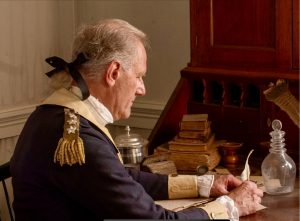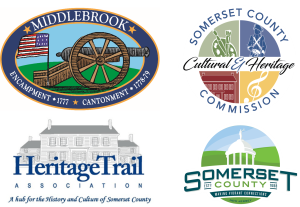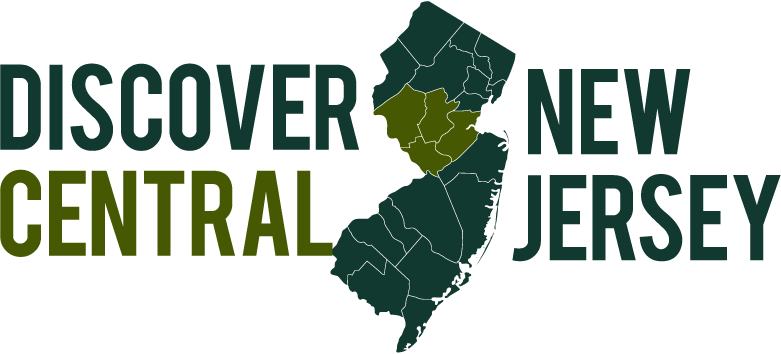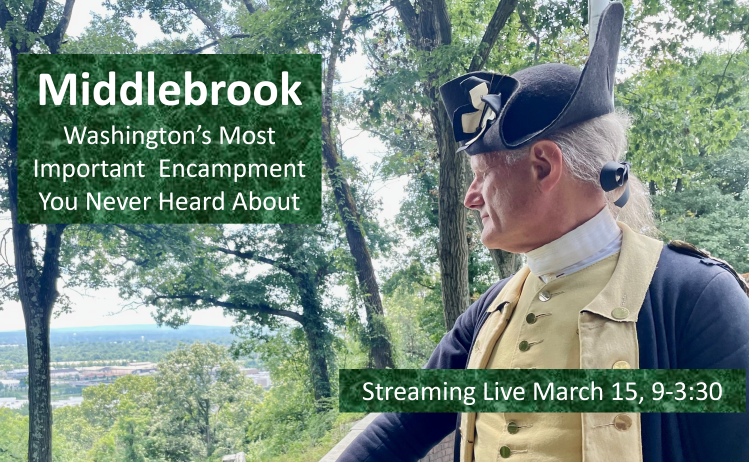THE IN-PERSON SYMPOSIUM IS NOW SOLD OUT. SIGN UP FOR THE LIVESTREAM!
“Valley Forge” and “Morristown” are famous names of winter encampments of George Washington and the Continental Army during arduous winters of the American Revolution. Less famously—but with equal strategic importance—the Continental Army also encamped twice in Somerset County, at a place called “Middlebrook.”
On the eve of the 250th anniversary of the founding of the United States, historians and history buffs will gather at Raritan Valley Community College in Branchburg, New Jersey, on March 15 to explore the strategic importance of the two Middlebrook Encampments, where thousands of American troops and leading generals dominated the New Jersey battlefield by holding the high ground of the Watchung Mountain range.

George Washington reenactor John Koopman writes a letter at The Wallace House in Somerville, which served as the Middlebrook headquarters.
This year’s symposium is the third in a series of four, and will focus on the Forage Wars, which refers to the competition between the American and British armies to feed themselves from the bounty of the Garden State. Tickets may be purchased to attend in person or virtually, from anywhere in the world. The program will run from 9 AM to 3:30 PM. Virtual attendees will have access for 30 days.
“The encampments at Valley Forge and Morristown may be more famous, but Middlebrook was just as important—in some ways, more so,” said Event Co-Director Linda Barth. “Protected by the Watchung hills, the Continental Army at Middlebrook waged a successful ‘forage war,’ throughout the central part of New Jersey.”
“My research suggests that Middlebrook represented a prolonged siege in which Somerset County played the key role in keeping the British Army confined to New York,” said Dr. Michael Beck, who will unveil a new video on the strategic importance of Middlebrook.
Funded in part with support from the Somerset County Cultural and Heritage Commission, a partner of the New Jersey Historical Commission, the program will run from 9 AM to 3:30 PM. The in-person event is now sold out, but tickets to the virtual event an be purchased at https://heritagetrail.org or directly here for $25.
The March 15 symposium will begin with Somerset County Commissioner Deputy Director Melonie Marano updating the County’s plans for the 250th anniversary of the nation in 2026. She will be followed by a video entitled, “The Forage Wars: The Battle for New Jersey,” created by Dr. Michael Beck. Next, David Lang will speak on “The Battle of Bound Brook,” followed by Dr. Richard Veit on “The Archaeology of Middlebrook.” Dr. Veit is Professor of Anthropology and Provost and Senior Vice President for Academic Affairs at Monmouth University. A North American historical archaeologist, his research focuses on the colonial Middle Atlantic Region. He is the author, co-author, or editor of eight books.
Additional presentations will be William Welsch on “The Two Middlebrook Armies,” Dan McCarthy on “The Hessians at Middlebrook,” and Larry Kidder on “the New Jersey Militia.” Mr. Kidder is a retired history teacher and the author of five books about New Jersey history including A People Harassed and Exhausted: The Story of a New Jersey Militia Regiment in the American Revolution; Ten Crucial Days: Washington’s Vision for Victory Unfolds; and The Revolutionary World of a Free Black Man: Jacob Francis, 1754-1836.
The Middlebrook encampments occurred in the spring of 1777 and the winter of 1778-1779, when 10,000 Continental troops spread out among the present-day municipalities of Bridgewater, Bound Brook, Manville, and Bedminster in what is known as a “cantonment” because of its duration and the durability of the huts they constructed.
This series has been developed and organized through the joint efforts of several local historical organizations including the Heritage Trail Association, Inc., Friends of Abraham Staats House, Friends of the Jacobus Vanderveer House, Somerset County Historical Society, Wallace House and Old Dutch Parsonage Association, Friends of Bridgewater History, Wallace House State Historic Site, Washington Camp Ground Association, Raritan Valley Community College, and New Jersey Society, Sons of the American Revolution.
Not sure about the Symposium? The following video from Somerset County provides a nice primer on the importance of Middlebrook:


